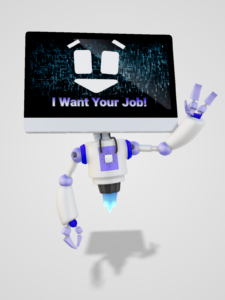Simplified Cybersecurity Solutions* Presents…
7 Questions You Have About Artificial Intelligence (But Are Afraid To Ask)
 “AI” or Artificial Intelligence are the buzz words encapsulating every industry in ways most people don’t understand, though many are afraid to admit that. Even the ones promoting its use and integration into every aspect of our daily lives don’t quite “get it”. We’re still in the “wait-and-see era” of Artificial Intelligence and Machine Learning taking over and turning things into a real iRobot situation (like the 2004 movie with Will Smith), so in the interim, let’s explore the 7 Questions You Have About Artificial Intelligence (But Were Afraid To Ask):
“AI” or Artificial Intelligence are the buzz words encapsulating every industry in ways most people don’t understand, though many are afraid to admit that. Even the ones promoting its use and integration into every aspect of our daily lives don’t quite “get it”. We’re still in the “wait-and-see era” of Artificial Intelligence and Machine Learning taking over and turning things into a real iRobot situation (like the 2004 movie with Will Smith), so in the interim, let’s explore the 7 Questions You Have About Artificial Intelligence (But Were Afraid To Ask):
1. What is Artificial Intelligence (AI)?
In a nutshell, “Artificial Intelligence” (AI) refers to the simulation of human intelligence in machines and systems that are programmed to think and learn like humans. Artificial Intelligence systems can perform a range of tasks that typically require human intelligence, such as reasoning, problem-solving, decision-making, visual perception, speech recognition, recognizing patterns, and language translation. AI technologies are designed to simulate human cognitive processes, allowing them to learn from experience and adapt to new information.
2. How Does Artificial Intelligence (AI) Work?
The simplified answer: Artificial Intelligence works by using large amounts of data and sophisticated algorithms to mimic human-like thinking and decision-making. AI learns things in a similar way that we do, but much faster and on a larger scale. It takes vast amounts of information (from the web and other sources like our smart devices), then processes it to identify patterns and make connections. For example, an AI system might analyze millions of photos of bananas to learn what makes a banana look like a banana. Once the system is trained, it can then recognize bananas in new images it hasn’t seen before. This ability to learn from data and apply that knowledge to new situations is what makes AI powerful, hence “intelligent”. It can then use this learned knowledge to make predictions, solve problems, or perform tasks, all without being explicitly programmed for each specific scenario.
3. What Are The Risks Associated With Using Artificial Intelligence?
Artificial intelligence, while offering many benefits, also comes with several risks that we need to be aware of. One major concern is privacy: AI systems often require large amounts of personal data to function effectively, and the use, misuse, and breaching of this data is an issue that can’t be ignored. There’s also the risk of bias in AI decision-making, where algorithms may inadvertently discriminate against certain groups due to flaws in their training data or design. Job displacement is another worry, as AI automation could lead to significant changes in the job market as people lose jobs that are more efficiently done by AI-powered robots and devices. Additionally, there are concerns about the lack of transparency in AI systems, making it difficult to understand how decisions are made. Safety issues arise when AI is used in critical systems like healthcare or autonomous vehicles, where errors could have serious consequences, including the loss of human life. There’s also the potential for AI to be used maliciously, such as in creating deepfakes (i.e. “fake news” or AI-generated media such as images, videos, or audio that convincingly mimic real people, posing risks for misinformation and privacy violations), or autonomous weapons (i.e. Military systems capable of selecting and engaging targets without human intervention, raising ethical concerns about the use of lethal force and the need for regulation). Lastly, as AI becomes more advanced, there are long-term concerns about maintaining human control over increasingly sophisticated systems (again, like in iRobot). These risks highlight the need for careful development, regulation, and ethical considerations in Artificial Intelligence (AI) deployment.
4. How Is Artificial Intelligence (AI) Helpful And What Are Some Benefits To Using It?
 Artificial Intelligence (AI) offers a wide range of benefits across various sectors, significantly enhancing human capabilities and improving efficiency. By reducing human error and automating repetitive tasks, AI increases accuracy and productivity while allowing people to focus on more creative and strategic work. Its ability to analyze vast amounts of data quickly leads to improved decision-making and valuable insights in fields like business intelligence and medical research. AI’s 24/7 availability enables round-the-clock service, enhancing customer experiences through personalized support and improving safety through constant monitoring in hazardous environments. From streamlining business processes to advancing healthcare diagnostics and treatment planning, AI is proving to be an invaluable tool that not only complements human efforts but also extends our capabilities in ways previously unimaginable, ultimately driving innovation and progress across industries.
Artificial Intelligence (AI) offers a wide range of benefits across various sectors, significantly enhancing human capabilities and improving efficiency. By reducing human error and automating repetitive tasks, AI increases accuracy and productivity while allowing people to focus on more creative and strategic work. Its ability to analyze vast amounts of data quickly leads to improved decision-making and valuable insights in fields like business intelligence and medical research. AI’s 24/7 availability enables round-the-clock service, enhancing customer experiences through personalized support and improving safety through constant monitoring in hazardous environments. From streamlining business processes to advancing healthcare diagnostics and treatment planning, AI is proving to be an invaluable tool that not only complements human efforts but also extends our capabilities in ways previously unimaginable, ultimately driving innovation and progress across industries.
5. When Should I Use Artificial Intelligence (AI) and How Do I Get Started?
As Artificial Intelligence becomes more prevalent, employees with AI skills will be in high demand. Thus: Now is the time to start! Learning about Artificial Intelligence and how it works in your industry can make you more valuable to your organization and open up new career opportunities. AI is already integrated in so many industries and tools (even if you don’t realize it), so by learning more about how it works, you can position yourself (and your organization) to take advantage of this transformative technology. To get started with Artificial Intelligence, first familiarize yourself with AI concepts so that you can have a basic understanding of AI terminology and concepts. You can start by reading AI guides or perusing online courses that introduce AI basics. I started with my tried-and-true book series for learning anything under the sun: Artificial Intelligence For Dummies (2nd Edition), however, I can understand if you want to start with a Beginner’s Guide Online. Taking some online courses or following some online study guide begins your journey, then your next step is playing around with some user-friendly starter AI tools (I’ll do a future post to delve more into the options, but a fair warning here: Don’t sign up for any new programs without doing some due diligence on what information they’re getting from you (and your devices) and how they intend to use them). There are many AI tools available for various tasks. I’m refraining from naming specific ones at this time, because I don’t want this introductory post to be taken as an endorsement of one over the others. The goal behind your first foray into the world of AI tools is to learn and experiment in a low-stakes environment to get a better understanding of its capabilities and limitations. That’s why I’m saving this AI tool conversation for a more in-depth post. In the meantime, try your best to keep up with the latest trends in information technology and follow AI news and developments. Also, keep an eye out for these discussions in your daily work life, especially if your organization publishes stories or guidance on its use or implementation. There’s likely going to be a push from all walks of life to get you to start using AI in some capacity, opting to give you “free access” to various tools and capabilities. Just be aware: When something is given to you for free: YOU ARE THE PRODUCT!
6. How Can AI Help Me Keep My Job And/Or Stay Competitive In My Job, Industry, or Field?
 This is the question that I got most often when I surveyed a group of novices about their curiosity of Artificial Intelligence! A lot of people are nervous about this topic and looking for ways to get a competitive advantage in their job/industry. Thus, embracing AI tools and using them to enhance your skills, productivity, and value to your organization, can give you that competitive edge. To help you leverage AI to stay professionally competitive, Look to: 1) Enhance your AI skills and knowledge by learning how it’s being integrated into your field; 2) Improve your productivity and efficiency by using AI tools to analyze large datasets of information to make data-driven decisions or automate repetitive tasks so you can focus on higher-value work; and 3) Stay informed about industry trends to keep up with the latest developments in your field, as well as how AI-powered tools and devices can help improve your personal and social life. As you work to find the ways that Artificial Intelligence will fit into your professional landscape, remember that AI is meant to augment human capabilities, not replace them, so focus on developing skills that complement AI technologies. Here’s a few ways this is working for these select professionals:
This is the question that I got most often when I surveyed a group of novices about their curiosity of Artificial Intelligence! A lot of people are nervous about this topic and looking for ways to get a competitive advantage in their job/industry. Thus, embracing AI tools and using them to enhance your skills, productivity, and value to your organization, can give you that competitive edge. To help you leverage AI to stay professionally competitive, Look to: 1) Enhance your AI skills and knowledge by learning how it’s being integrated into your field; 2) Improve your productivity and efficiency by using AI tools to analyze large datasets of information to make data-driven decisions or automate repetitive tasks so you can focus on higher-value work; and 3) Stay informed about industry trends to keep up with the latest developments in your field, as well as how AI-powered tools and devices can help improve your personal and social life. As you work to find the ways that Artificial Intelligence will fit into your professional landscape, remember that AI is meant to augment human capabilities, not replace them, so focus on developing skills that complement AI technologies. Here’s a few ways this is working for these select professionals:
- Communications Specialist: AI writing assistants aid in drafting press releases and social media content, and sentiment analysis tools help gauge public opinion on campaigns.
- Human Resources (HR) Specialist: AI-powered tools are being used to enhance efficiency and decision-making in employment recruitment processes like analyzing resumes and screening candidates. Additionally, chatbots can be used to handle routine employee inquiries about benefits, policies, and procedures.
- Chief Diversity Officer (CDO): Artificial Intelligence tools can be used to automate bias detection in company communications and policies, and gauge sentiment analysis about inclusion initiatives among employees.
- [The Other CDO] Chief Data Officer (CDO): AI technology and tools can increase effectiveness by improving data quality, enabling advanced analytics, and fostering cross-functional collaboration within an organization.
7. Was This Article Written By Artificial Intelligence?
You tell me. Now that you’re at the end of it: Did I write this? Or was artificial intelligence the author? Comment below (or message me on LinkedIn after connecting) and I’ll tell you the answer.
*Simplified Cybersecurity Solutions is a joint venture from SSS for Success (Simplified Social Media Solutions).


